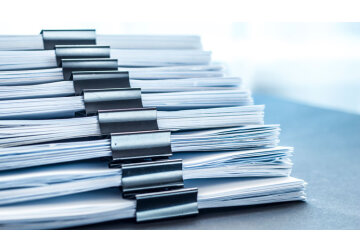
Amendments to legislation aimed at promoting business activity (package II) have come into force.
The bill was published in Monitorul Oficial and came into force on November 22. Most of its provisions concern amendments to the Tax and Customs Codes. One of the measures provides for the possibility of deducting VAT on the basis of cash receipts/fiscal documents issued by cash register equipment connected to the Automated Information System “Electronic Sales Monitoring” for purchases whose value for each receipt does not exceed 2 thousand lei including VAT, but not more than 10 thousand lei for one tax period, subject to payment by business payment card. There is an exemption from VAT without the right of deduction for domestic goods previously exported using postal services and returned in the same condition within 3 months from the date of export. If, when exporting, the amount of VAT for a given product was refunded, the taxpayer will be required to calculate and declare the amount of VAT for the month in which the return of the goods took place. The provision of the Tax Code obliging taxpayers to enter the data of the daily report (report Z) of closing cash register equipment into the register of cash register equipment at the end of the working day has been abolished. The amount of arrears, which are not considered tax debt, has been increased from 100 to 500 lei. Some procedures related to calling the State Tax Service, as well as the hearing procedure, are being simplified. It is provided that the State Tax Service will not require the submission of documents on paper if they are sufficient and can be presented in the form of an electronic document and/or scanned copies of documents available on paper, with a qualified electronic signature of the called person affixed under their own responsibility. At the same time, a meeting to consider a tax violation case can be held without the physical presence of participants - using electronic means of communication. The code specifies the procedure for organizing such meetings. Another change to the Tax Code concerns the removal of barriers to appeals before the Dispute Review Board. In particular, the size of the minimum obligation that can be appealed to the Dispute Resolution Council of the State Tax Service has been halved: from 500 thousand to 250 thousand lei - for economic agents and from 250 thousand to 125 thousand lei - for individuals. Herewith, the Dispute Resolution Council will consist of at least 50% representatives of business associations related to the customs sector. According to the amendments to the Customs Code, gasoline and diesel fuel are included in the list of products allowed under the customs warehouse regime, and the Customs Service will accept guarantees issued by any licensed bank in Moldova, and not just a recognized customs department. The process of declaring goods imported into the territory of Moldova and exported through international mail and unaccompanied baggage has also been simplified: such property will be declared in a simplified manner. // 23.11.2023 — InfoMarket







